Famous Greek Philosophers – A Look at Ancient Greek Philosophy
What would the world be without Greek philosophy? The ancient Greeks were a highly civilized society that relied on mythology and religion quite heavily, yet also contributed significantly to the fields of politics, science, art, and mathematics. In this article, we will explore the personalities and contributions of the famous Greek philosophers who provided the foundations of many important theories that have shaped modern philosophy and the development of government systems. Read on for more about the greatest Greek philosophers and some of their most groundbreaking concepts!
Contents
- 1 An Introduction to Greek Philosophy: Thinking Beyond and for Society
- 2 The Top 15 Most Famous Greek Philosophers
- 2.1 Thales of Miletus (c. 625 – 548 BCE)
- 2.2 Anaximander (610 – 546 BCE)
- 2.3 Heraclitus (c. 500 BCE)
- 2.4 Pythagoras (570 – 495 BCE)
- 2.5 Parmenides (560 – 510 BCE)
- 2.6 Anaxagoras (500 – 428 BCE)
- 2.7 Empedocles (494 – 434 BCE)
- 2.8 Zeno (490 – 430 BCE)
- 2.9 Democritus (460 – 370 BCE)
- 2.10 Socrates (469 – 399 BC)
- 2.11 Plato (428 – 347 BCE)
- 2.12 Aristotle (384 – 322 BCE)
- 2.13 Pyrrho (360 – 270 BCE)
- 2.14 Epicurus (341 – 270 BCE)
- 2.15 Zeno of Citium (334 – 262 BCE)
- 3 Frequently Asked Questions
An Introduction to Greek Philosophy: Thinking Beyond and for Society
What is ancient Greek philosophy? The field of philosophy is presently understood to encompass the study of fundamental questions about human existence and includes questions about knowledge, the human mind, morals, values, and reason. These basic aspects are what help us discern the appropriate or desired ways of living and include the way we govern ourselves, think about society, and interact with reality. The ancient Greek world was the birthplace of many ideas and modern philosophies around the way that we think about government systems, solve issues, and decipher religion and its place in our everyday life. Early philosophy proposed many ideas across physics, science, politics, religion, education, art, and culture that range from proto-scientific theories about atoms to detailed methods for practicing philosophy itself. You may already be familiar with the names of key Greek philosophers such as Aristotle, Socrates, and Plato, however, there were many more important thinkers whose ideas helped found different movements and schools of thought within philosophy.
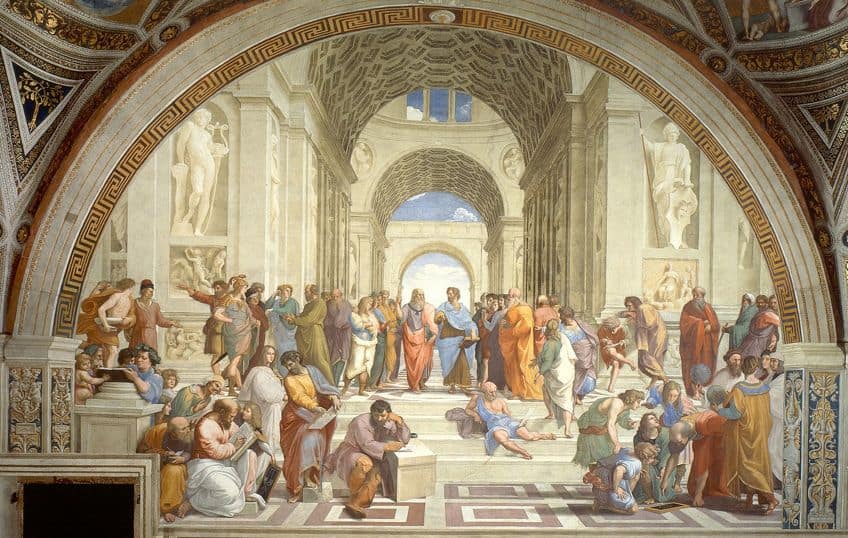
Each philosophy caters to specific ways of living or governing oneself and the way we perceive the world around us. Philosophy also sheds light on the micro-interactions with our environment and the many relationships that seem to connect us to the external world known as “reality”. From the Hellenists to the Stoics, each philosophy was developed using core principles established by these great thinkers. Without great thinkers, the world might have turned out very different, or perhaps, less complicated in the lack of awareness of reality and relationships. Ancient Greek philosophy was also predominantly occupied with prioritizing the voice of reason and logic such that the natural world could be deciphered for the betterment of society. Philosophers would also be cast in predicaments of their own since conflicting opinions about the duality of principles and their effects on society were common. Since mythology and religion were very much at the heart of ancient Greek civilization, a few philosophers were even criticized and even put to death for their ideas and beliefs around God and what was considered “right”. Either way, having an idea that opposed the larger masses was seen as controversial and, in some cases, in opposition to the government.
In short, Greek philosophy provided the basic foundations for the development of Western intellectual theories.
The Top 15 Most Famous Greek Philosophers
Now that you have a brief idea of the power of ideas in ancient Greece, you can now discover the top 15 greatest Greek philosophers of ancient history. Below, you will also discover some of the most influential and significant theories around cosmology, science, and self-governing systems that will possibly alter and inspire your view of the world today!
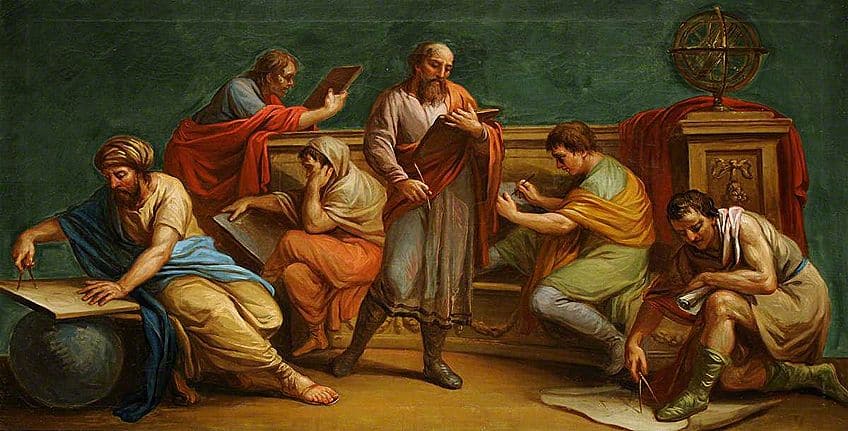
Thales of Miletus (c. 625 – 548 BCE)
| Name | Thales of Miletus |
| Date of Birth | c. 625 BCE |
| Date of Death | c. 548 BCE |
| Nationality | Greek |
| Associated Concepts and Themes | Ionian/Milesian, astronomy, metaphysics, and mathematics |
| Notable Publications or Ideas |
|
Thales of Miletus was a famous Greek philosopher who was part of the Ionian/Milesian school of philosophy that shaped the trajectory of ancient Greek philosophy itself. Thales was also credited with being the founding father of ancient Greece as one of several sages. The Seven Sages were also known as the seven wise men and was a Classical Greek term for statesmen or philosophers who operated between the 7th and the 6th centuries BCE. The Temple of Apollo contains a famous inscription coined by Thales, which states, “Know thyself” (identified in Greek as gnothi seauton) and as such, he was considered to be the first philosopher in Greek history. Thales was recognized as the first individual to critically engage in deductive reasoning, and logic, and pursue the study of early mathematics and science.
Thales thus set the foundations of what is known as natural philosophy, which did not rely on the knowledge from mythology, and instead was aimed at studying elements of the real world.
In mathematics, Thales is also credited with creating his own theories: the Thales Theorem, and the intercept theorem. It had been speculated that Thales was also an early weatherman who studied the skies and predicted the weather as well as a solar eclipse and the time periods of the solstices and the equinoxes. If this was not impressive enough, Thales’ sharp mind also enabled him to divert the Halys River, thus introducing early Greek engineering. Another major idea proposed by Thales was that “all was water” or water was the arche, which was later referenced by Aristotle. Aristotle described the theory as water was essentially the originating principle of nature and was deemed a single substance and therefore “all things are one”. His prediction of the eclipse in 585 BCE was also dubbed the moment of “the birth of science” by American writer Isaac Asimov.
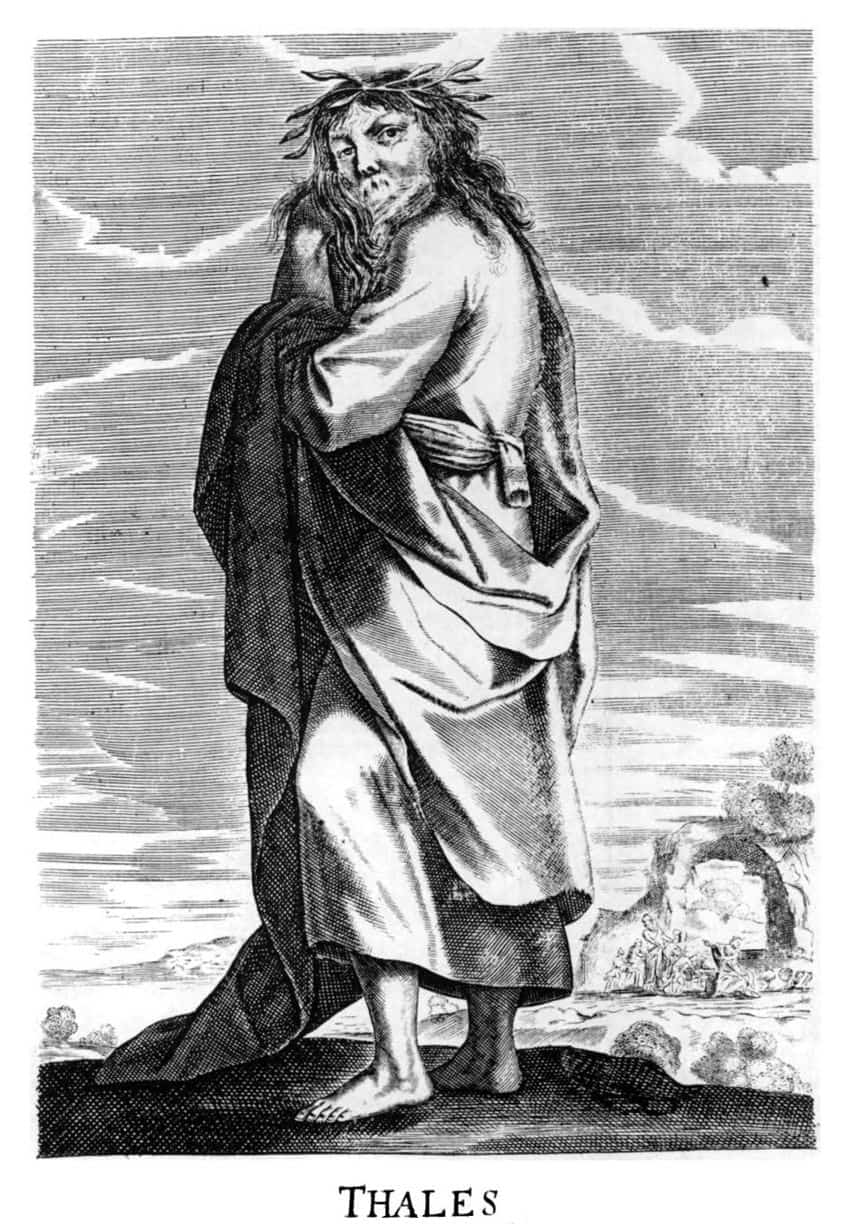
Anaximander (610 – 546 BCE)
| Name | Anaximander |
| Date of Birth | c. 610 BCE |
| Date of Death | c. 546 BCE |
| Nationality | Greek |
| Associated Concepts and Themes | Metaphysics, astronomy, geometry, geography, Ionian, Milesian, and Naturalism |
| Notable Publications or Ideas |
|
Anaximander was the student of Thales and one of the greatest Greek philosophers who was responsible for penning some of the first scientific theories around the origins of the universe as well as the conclusion that nature was ruled by laws as seen in human societies. His interests spanned astronomy, physics, geometry, politics, and cartography and he is credited with creating one of the first and most important maps of the world that significantly helped the field of geography. Anaximander was an explorer who attempted to identify and document the way the world functioned and looked. He was one such philosopher who sought to create structure, even among the stars.
One of his major contributions to astronomy was made in his attempts to define the mechanics of the movements of celestial objects and their relation to the Earth.
Some of the key influences on his theories included the philosophy of Thales, Greek mythical traditions, Babylonian observations, and other important information from older civilizations. His life purpose was dedicated to establishing a life order or at least attempting to decipher the natural laws of the cosmos. His claims about the order of the cosmos were that it was not monarchic, but rather, geometric, which explained the position of the Earth. His rational approaches to deciphering through the multitude of information also led him to conceive of the universe as an abstract concept of Apeiron, or infinity, which was endless and possibly influenced by the Greek cosmogony on the origin of the universe as born through Chaos or the abyss. The functioning of Chaos was assumed to be a void that could create without decaying and does so from a state of nothingness.
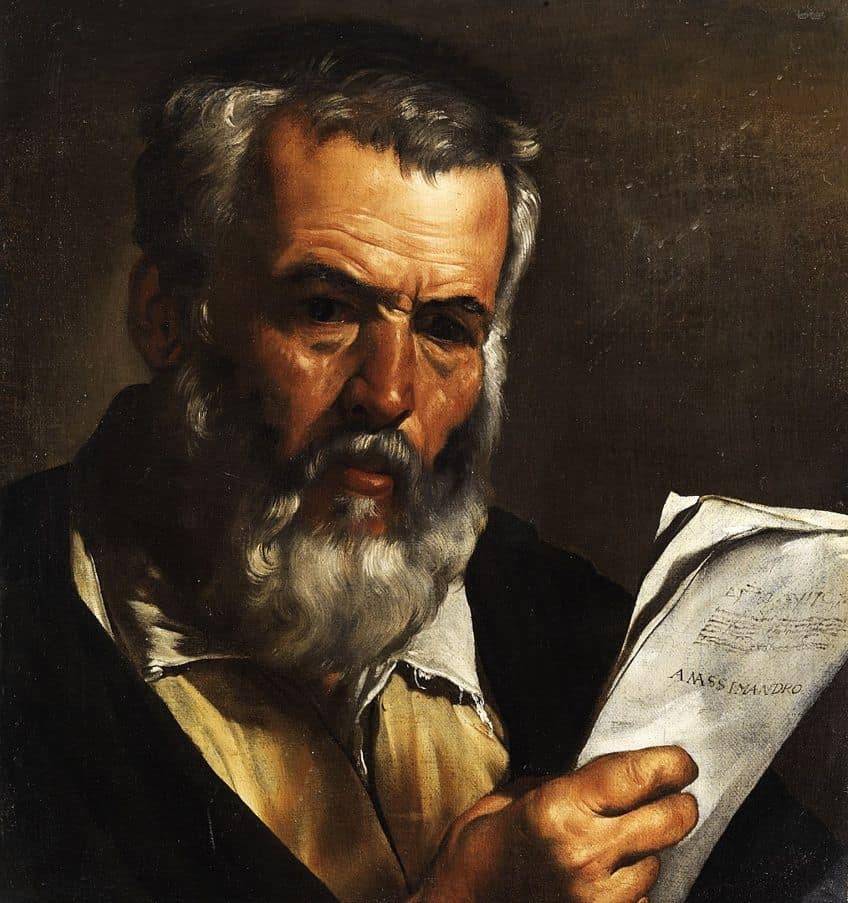
Heraclitus (c. 500 BCE)
| Name | Heraclitus |
| Date of Birth | c. 500 BCE |
| Date of Death | Unavailable |
| Nationality | Greek |
| Associated Concepts and Themes | Cosmology, process, paradox, Western philosophy, Ionian school, and pre-Socratic philosophy |
| Notable Ideas |
|
Heraclitus was one of the major early Greek philosophers of the 6th century who was also known as “the weeping philosopher”, primarily for his rather bleak worldview of the state of existence. Heraclitus’ philosophy championed the idea that the existence of one thing is dependent on the existence of two other things that are opposite to each other and in theoretical terms, was identified as the unity of opposites. He was also known for his concept of change, which described the state of the world as being in a constant state of flux, as a place that was always in a state of becoming, but never actually being.
This belief was complemented by his most famous statement on flux, that “no man can ever step on the same river twice”.
His concept of panta rhei, which translated to “everything flows”, also reinforced this concept alongside the importance of the existence of opposites, which were recognized as key to understanding the world. Heraclitus’ contribution to philosophy and the field of metaphysics has had a profound influence on the works of other philosophers such as Plato and Georg Wilhelm Friedrich Hegel. Heraclitus also helped develop the concepts of dialectical materialism and process philosophy, which were inspired by the unity of opposites and change.
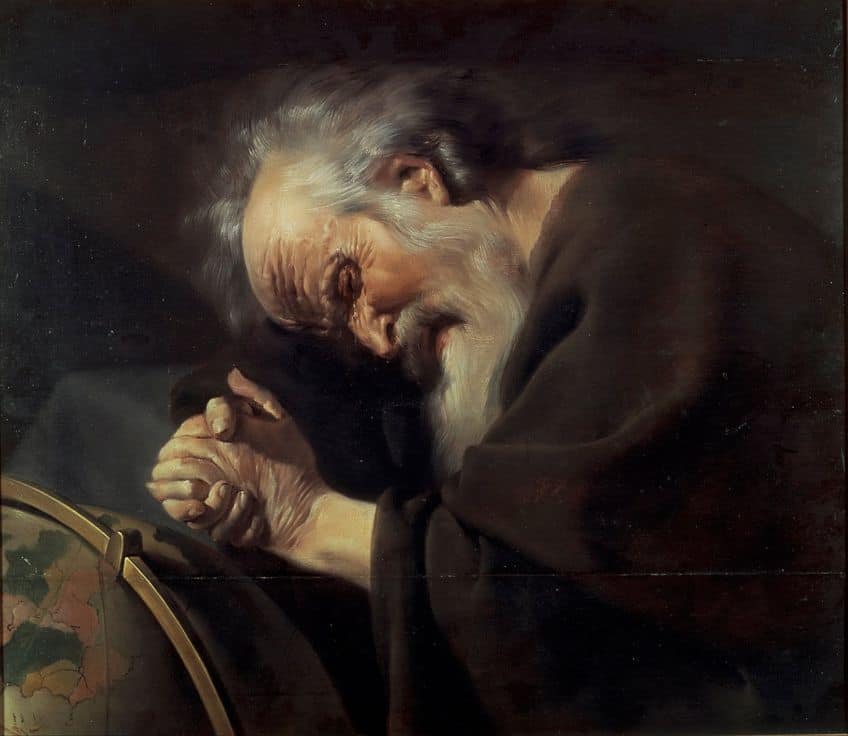
Pythagoras (570 – 495 BCE)
| Name | Pythagoras of Samos |
| Date of Birth | c. 570 BCE |
| Date of Death | c. 495 BCE |
| Nationality | Greek |
| Associated Concepts and Themes | Ethics, mathematics, metaphysics, music theory, mysticism, politics, and religion |
| Notable Publications or Ideas |
|
Pythagoras of Samos was among the greatest Greek philosophers of the Ionian school of philosophy during the 6th century BCE who was best known for his contributions to numerology. Pythagoras was among the most “mystic” of Greek philosophers whose followers would first take a “vow of silence” to learn Pythagorean philosophy (called symbols) and swear to not reveal these symbols to non-members. Pythagoras was somewhat of a supernatural figure to his Greek contemporaries who claimed to have a “golden thigh” that he exhibited at the Olympic Games, as stated in the writings of Aristotle. Above all legends and myths about Pythagoras, he was best remembered for his contributions to mathematics, medicine, music, and astronomy.
After discovering the Pythagorean theorem, it was speculated that Pythagoras gave thanks to the Gods by sacrificing an ox, however, other philosophers disagreed since Pythagoras was known to avoid blood sacrifices.
Other important ideas and discoveries that came from Pythagoras include teachings that the Earth was round, the Earth was divided into five climatic zones, and the identification of Venus. Towards the early 4th century, Pythagoras’ theories and teachings infiltrated the lands of Magna Graecia, Thebes, and Phlius. Pythagoras’ influence on art was also profound during the 6th century since his beliefs were said to have caused an uprising in Greek sculpture. This occurred when Greek sculptors and architects sought to find the correlation between mathematics and aesthetic perfection. Sculptors like Polykleitos referenced ideas from Pythagoras’ teachings that inspired him to propose that beauty was found in proportion and as such the interrelatedness of parts to each other and the whole.
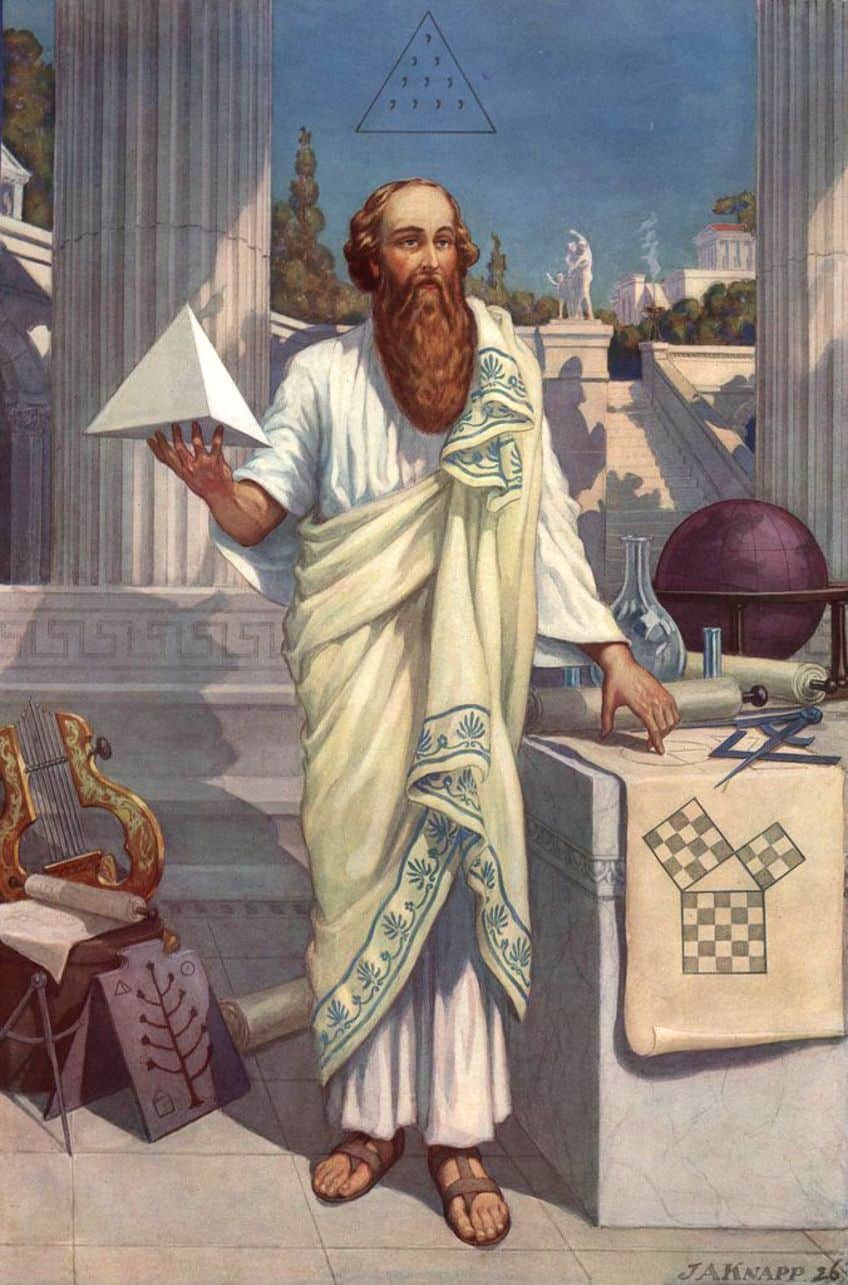
Parmenides (560 – 510 BCE)
| Name | Parmenides of Elea |
| Date of Birth | c. 560 BCE |
| Date of Death | c. 510 BCE |
| Nationality | Greek |
| Associated Concepts and Themes | Ontology, poetry, cosmology, Western philosophy, Eleatic philosophy, and pre-Socratic philosophy |
| Notable Publications or Ideas |
|
Parmenides of Elea was one of the most iconic and influential early Greek philosophers who was born to a wealthy family and was best known for his poem On Nature, including his theories around reality, the impossibility of change, and monism encompassed by his theory of Aletheia. On the other hand, he also presented the other side of reality called “the way of Doxa”, which describes the sense of one’s perception of the world and opinions that cause distortion or false narrative of reality. Parmenides was also dedicated to the observation of nature, and at the time, such men were given the title physicist.
He was also speculated to have been a doctor in addition to a legislator.
Alongside Zeno, his disciple, Parmenides was also recorded in Athens where he met the young Socrates, however, the possibility of this meeting is contested by many scholars. Parmenides’ original poem On Nature was believed to be approximately 800 verses long and was written in an ancient Greek rhythmic scheme called a dactylic hexameter, divided into three parts. Today, Parmenides is credited with being the first philosopher to distinguish ontology as a separate discipline from theology with many of his theories around monism influencing the development of Neoplatonism and the philosopher Plotinus.

Anaxagoras (500 – 428 BCE)
| Name | Anaxagoras |
| Date of Birth | c. 500 BCE |
| Date of Death | c. 428 BCE |
| Nationality | Greek |
| Associated Concepts and Themes | Western philosophy, Ionian school, natural philosophy, and ancient philosophy |
| Notable Publications or Ideas |
|
Born under the Persian Empire, Anaxagoras was one of the most revolutionary philosophers of the 5th century and was known as the “lord of the assembly”. Anaxagoras first introduced the notion of the cosmic mind called Nous, which was presented as an “ordering force”. His work in astronomy and eclipses were also correct in addition to his explorations of the phenomena of rainbows and meteors. Anaxagoras was fueled by the ideas of Parmenides, who argued against the impossibility of change through natural phenomena.
His influence on Athens was significant considering his introduction of Ionian philosophy and the idea of scientific inquiry from Ionia.
Anaxagoras’ theory about the origin of all things was also rooted in the belief that all things existed from a beginning point and that all things started as smaller fragments of themselves, endlessly in number and scattered across the universe. Anaxagoras also wrote a philosophy book, of which the surviving texts were only mentioned in the work of Simplicius in the 6th century CE. Later on, Anaxagoras was also mentioned in the iconic comedy Divine Comedy (Inferno) written by Dante Alighieri as belonging to the first circle of hell.

Empedocles (494 – 434 BCE)
| Name | Empedocles |
| Date of Birth | c. 494 BCE |
| Date of Death | c. 434 BCE |
| Nationality | Greek |
| Associated Concepts and Themes | Cosmogony and Biology |
| Notable Publications or Ideas |
|
Empedocles was a champion of exploring the origins of the universe and the cosmos as well as the four basic elements of the Earth. Empedocles was also famous for developing a distinct doctrine on reincarnation while engaging in the critical discourse around monism. Empedocles believed that the four elements were fused and parted from one another through the divine powers of love and strife. Love enabled the attraction of matter while strife enabled their separation. Along with the four elements, Empedocles also identified the names of the four major deities: Zeus, Nestis, Hera, and Aidoneus.
Empedocles also pursued metempsychosis, which included the transmigration of the soul whereby he believed that the soul could be interchanged with that of animals, humans, and plants.
His intriguing theory around the cycle of humans and how they originated on the Earth was that a select few humans were the first daemons from long ago who enjoyed the bliss of divinity before committing a crime related to perjury or bloodshed. As a punishment, they were sent to the Earth where they had to live through 30,000 cycles of metempsychosis before returning to the realm of the divine. During this metempsychosis, their souls would be able to move through different bodies, over multiple lifetimes, until their time was fulfilled.
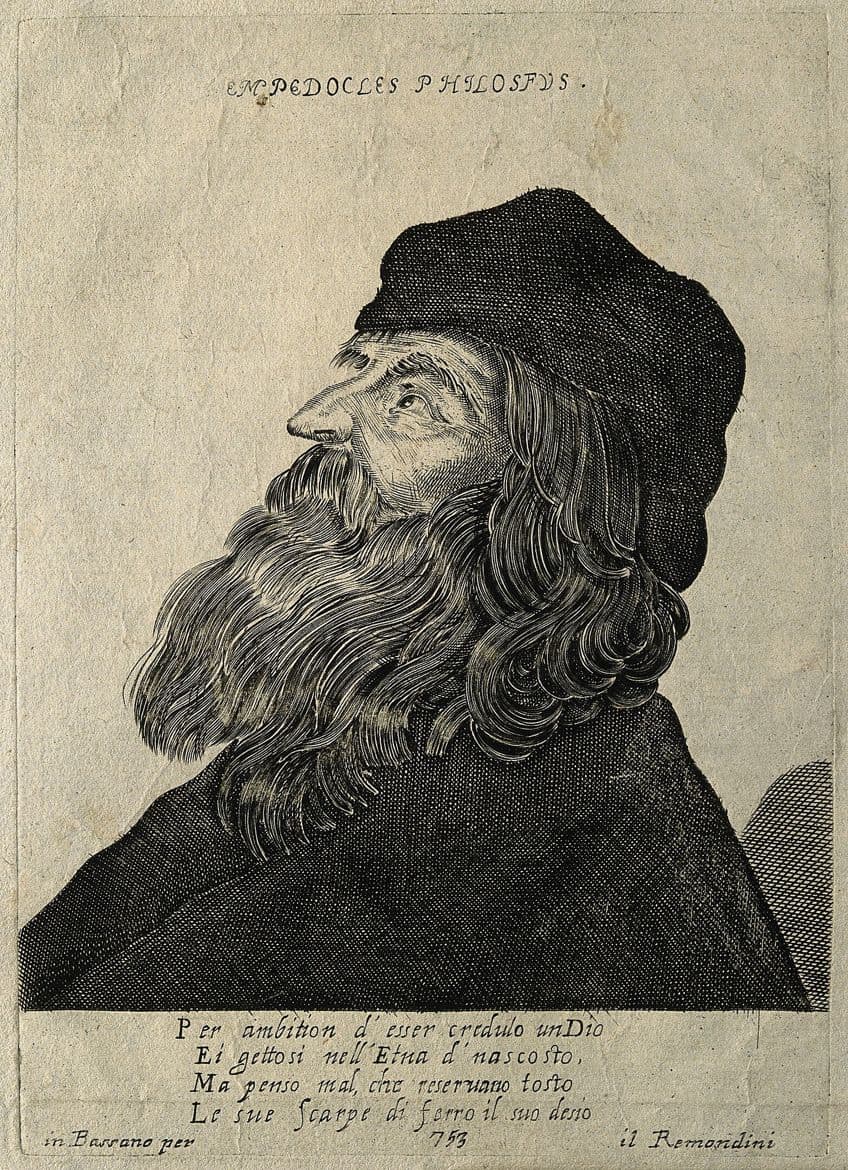
Zeno (490 – 430 BCE)
| Name | Zeno of Elea |
| Date of Birth | c. 490 BCE |
| Date of Death | c. 430 BCE |
| Nationality | Greek |
| Associated Concepts and Themes | Eleatic, metaphysics, and ontology |
| Notable Publications or Ideas |
|
Zeno of Elea was among the prominent early Greek philosophers and a notable figure of the Eleatic school, which was established by the famed philosopher Parmenides. Zeno was most famous for his set of paradoxes or philosophical problems. According to accounts of Zeno, he was considered to be “tall and fair to look upon”, and was beloved by his elder, Parmenides. Unfortunately, many of Zeno’s paradoxes did not survive antiquity and are only referenced in accounts by others such as Plato. Zeno’s paradoxes were genius in that they managed to confuse and anger the most established physicists, mathematicians, and philosophers.
In total, Zeno produced more than 40 contradictions and issues with the most astounding and complex problems that argue “against motion”, which were later referenced by Aristotle.
Zeno’s works are considered to be the first known examples of a style of argument known as reduction ad absurdum, which means to “reduce to the absurd” and was derived from Parmenides. Zeno was also a figure with significant social drama since he was also accused of conspiracy to overthrow a local tyrant called Nearchus the tyrant. Zeno was then subject to torture and eventually had the opportunity to attack Nearchus, after which he was unfortunately executed. Today, he is recognized as the first philosophical figure to reference the mathematical concept of infinity.
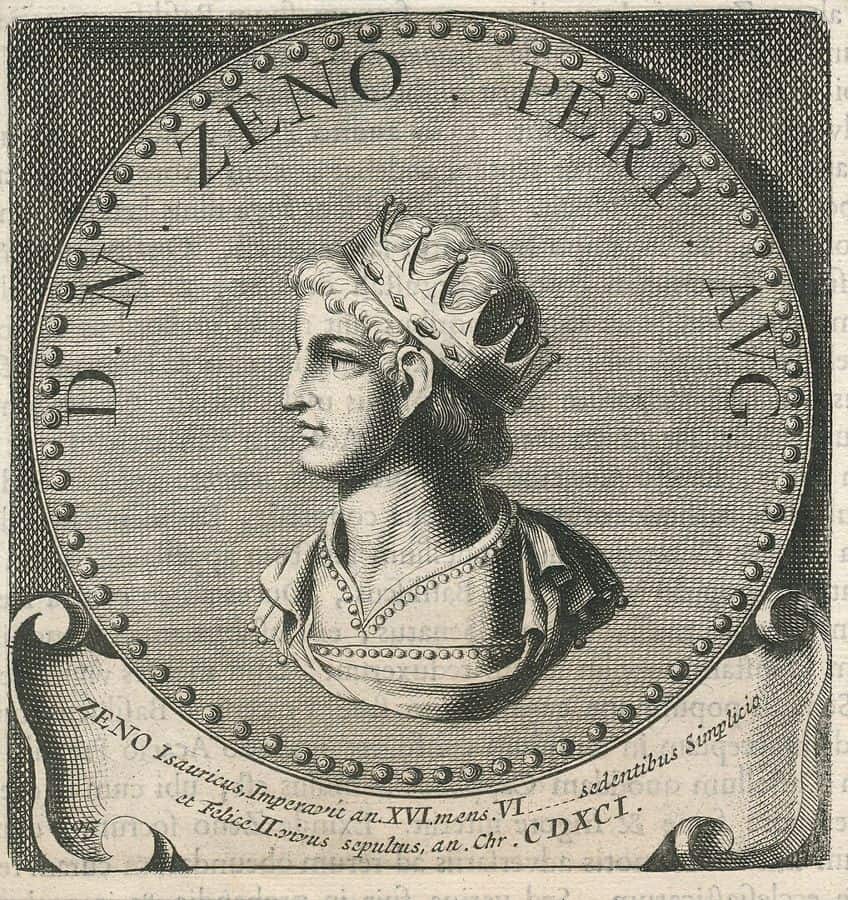
Democritus (460 – 370 BCE)
| Name | Democritus |
| Date of Birth | c. 460 BCE |
| Date of Death | c. 370 BCE |
| Nationality | Greek |
| Associated Concepts and Themes | Nature, atomism, Western philosophy, and pre-Socratic philosophy |
| Notable Publications or Ideas |
|
Democritus was an Abdera-born Greek philosopher who was most famous for his atomic theory, which was considered a major scientific breakthrough. Despite none of his work surviving, he proposed that everything was made up of atoms and that between atoms, existed empty spaces that were indestructible and will forever remain in motion.
He also proposed that there are an infinite number of atoms that come in different sizes and shapes. His work was also influenced by his mentor Leucippus who shared similar beliefs and theories. His work on atomism thus made him more of a scientist than a philosopher, since his theory was an idea that seemed to have been born of modern descent, contrary to any other theory of the antiquity age.
It is more likely to state that Democritus was definitely ahead of his time and later proposed the theory of the atomistic void in response to the work of Parmenides and Zeno.
Democritus’ idea that there must be a void was later developed in Isaac Newton’s theory of absolute space, which outlined the reasonable and logical requirements for reality as not-being. After Newton, Albert Einstein also developed the theory of relativity, which superseded previous theories and as such proposed that space was relative and could not be separated from time under a generally curved space-time manifold. Democritus also theorized that there were many worlds and that worlds could be destroyed through collisions with each other. Additionally, Democritus also had his hands in anthropology, aesthetics, fine art, and mathematics, all of which were significant contributions in their own right owed to rational thinking.

Socrates (469 – 399 BC)
| Name | Socrates |
| Date of Birth | c. 469 BCE |
| Date of Death | c. 399 BCE |
| Nationality | Greek |
| Associated Concepts and Themes | Epistemology, ethics, and teleology |
| Notable Publications or Ideas |
|
Athenian-born Greek philosopher Socrates was one of the most famous Greek philosophers of the 5th century who taught Xenophon and Plato. Socrates is credited with being the founder of traditional Western philosophy and is regarded as one of the first philosophical figures to focus on the ethical tradition of thought and morals. Many of Socrates’ written texts were created in a dialogue format to examine a particular subject, which resulted in the invention of the Socratic dialogue literary genre. Around 399 BCE, he was also accused of “corrupting the youth” and was put on trial for a day, which resulted in his execution soon after. Some of Socrates’ most well-known statements and philosophical inquiries included his public acknowledgment of his own ignorance, which he claimed was the first step in philosophizing. Socrates’ philosophy had a vast influence that reached critical thinkers centuries later in the Italian Renaissance and figures of Humanism. An interesting point of interest about Socrates is that he never penned his texts in detail or published anything of a solid foundation.
What is known about the Greek philosopher is derived from accounts from others such as his student, Plato, and the historian Xenophon, of which the accounts may or not be historically authentic since Xenophon was not entirely invested in Socrates’ concepts or philosophies. Socrates was also the inspiration for a character in Aristophanes’ Athenian comedy and featured as “an absurd atheist”.
Socrates was also reportedly known for his unpleasant physical traits and facial features that were considered traditionally “ugly” and were the subject of public jokes from the youth. While the youth of Athens occasionally joked about Socrates’ appearance, they also admired his teachings. Socrates was also born into wealth and thus had an indifference toward material pleasures. He was known to often neglect his personal hygiene but practiced a balanced lifestyle across drinking, eating, and sex. The accusations thrown at Socrates included accusations that he worshiped false Gods, corrupted the youth, and did not worship the state religion. His accusations stemmed from a poet named Meletus who charged him with asebeia and requested the death penalty for Socrates. Among the arguments that circulated in the trial, Socrates was believed to listen to a daimonion, also known as his inner voice, which his accusers suggested was of divine origin. Essentially, Socrates and his teachings and way of living from his inner voice were seen as a danger to society and as such, he was put to death by the very society he tried to change.
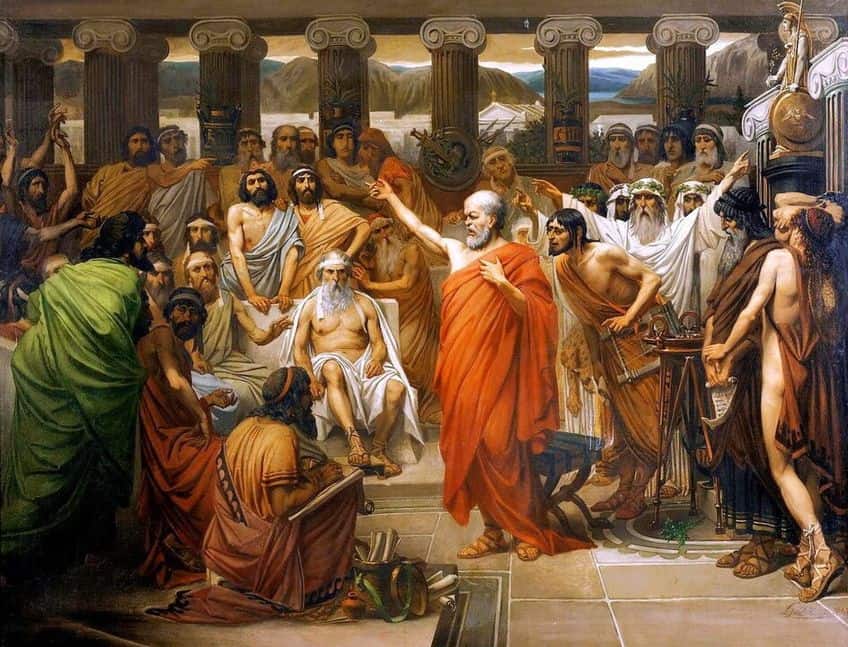
Plato (428 – 347 BCE)
| Name | Plato |
| Date of Birth | 428 BCE |
| Date of Death | 347 BCE |
| Nationality | Greek |
| Associated Concepts and Themes | Ethics, mathematics, science, moral psychology, political philosophy, epistemology, theology, cosmology, aesthetics, and the philosophy of language |
| Notable Publications or Ideas |
|
You may be familiar with the Greek philosopher, Plato and his allegory of the cave, which became one of the key stories of philosophy outlining how philosophers perceived the world. The allegory describes the human condition in its risen and fallen states while highlighting the deceptive nature of reality. The story thus urges people to focus on the abstract world of ideas and become critical thinkers of reality. Plato was the teacher of Aristotle and the student of Socrates. He was also the founder of the Academy whose “unparalleled influence” explored the metaphysical notion of “forms”, characterized by “justice, beauty, and equality”. For Plato, these concepts were essential to the sensibility of the world and required rational treatment such that when applied correctly, they led to the “good life”.
He also deduced that this version of a “good life” also required specialized knowledge alongside the harmony of the soul, which was split into three parts: “reason, spirit, and appetite”.
Another interesting fact about Plato’s philosophical journey was that much of his work was inspired by the teachings and downfall of Socrates in a democratic society that accused Socrates of “corrupting the youth”. Plato founded his own academy around 380 BCE, which is credited as the ancestor of the modern-day “academic university.” Under Plato, the ultimate success in ethics was attributed to the ultimate achievement of “goodness”, which was later adapted in Aristotle’s train of thought as the wider “good” for humans.
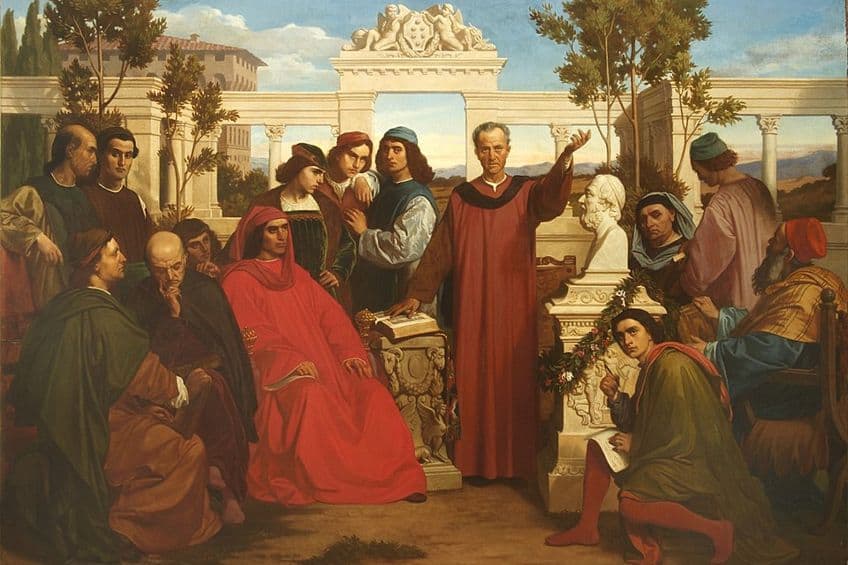
Aristotle (384 – 322 BCE)
| Name | Aristotle |
| Date of Birth | 384 BCE |
| Date of Death | 322 BCE |
| Nationality | Greek |
| Associated Concepts and Themes | Organon, physics, metaphysics, Nicomachean ethics, politics, rhetoric, poetics, Platonic academy, natural philosophy, and logic |
| Notable Publications or Ideas |
|
Aristotle was among the most popular Greek philosophers of the 4th century BCE who championed the genres of theoretical, practical, and natural philosophy while developing his own philosophical principles of reasoning called Aristotelianism. Aristotle was an incredible figure who influenced many modern philosophers centuries later while also displaying his abilities of deductive reasoning and genius across the fields of science, music, zoology, politics, geology, meteorology, psychology, drama, and many other fields. Aristotle undoubtedly amasses a wealth of knowledge that he also understood and applied to the founding of the Peripatetic school of thinking and later Aristotelianism.
A polymath from Northern Greece, Aristotle was a student of Plato’s academy up until the age of 37 and later went on to tutor Alexander the Great as well as Ptolemy and Cassander.
Aristotle produced numerous treatises and books of which only a fraction of his writings survived. His ideas were also foundational to scholars of the Middle Ages and through to the Renaissance where his ideas about physical science were adopted and evolved to help establish the genre of classical mechanics. Aristotle’s reach was far and wide and even influenced the philosophies of Judaism and Islam, as well as Christian theology.
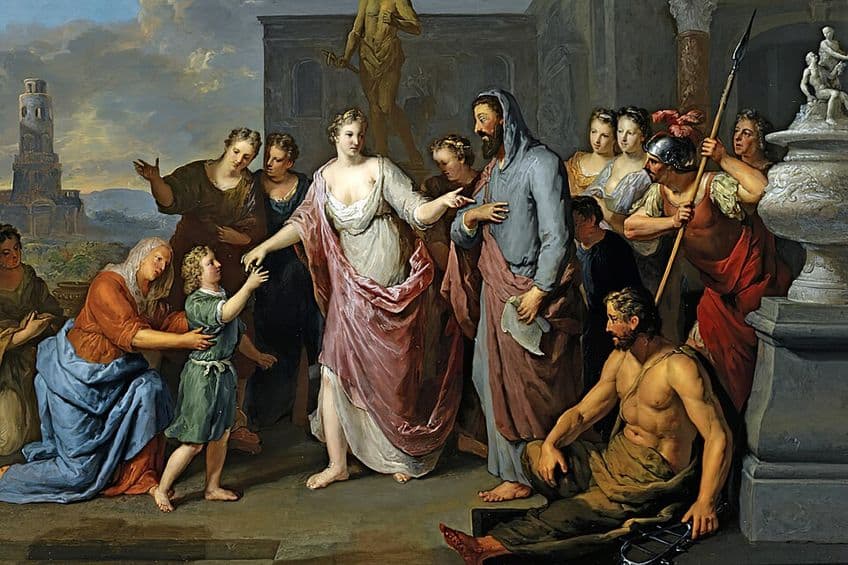
Pyrrho (360 – 270 BCE)
| Name | Pyrrho of Elis |
| Date of Birth | c. 360 BCE |
| Date of Death | c. 270 BCE |
| Nationality | Greek |
| Associated Concepts and Themes | Hellenistic philosophy, Western philosophy, Skepticism, Pyrrhonism, epistemology, metaphysics, and ethics |
| Notable Publications or Ideas |
|
Pyrrho of Elis was a famous Greek philosopher who founded the first school of Skepticism and advocated for the removal of judgment and the avoidance of any dogmatic beliefs. One of Pyrrho’s strongest beliefs was built on the theory that knowledge was an impossible aspect to attain for humans and that humans should avoid making any claims about the nature of reality. His skepticism about building knowledge around the nature of reality had a tremendous influence on the development of Greek philosophy since many of his ideas were later adopted by other figures such as Empiricus, Sextus, and Michelle de Montaigne. Pyrrho’s most significant contribution to the field of philosophy was his theory of the epoche, which referred to the suspension of judgment and was built on the belief that one should withhold their judgment of the world and reality since the human senses are unreliable and that beliefs would therefore be founded on faulty reasoning.
He thus concluded that the only way to avoid making mistakes was to remain a skeptic of everything, even extending skepticism to our personal beliefs and perceptions about reality.
Pyrrho’s view of human perception and the weight that it held as a reliable source of knowledge also influenced Buddhist beliefs, which also advocated for the state of non-attachment. Additionally, Pyrrho also advocated for living a simple and virtuous lifestyle through which happiness could only be achieved by the elimination of pleasure and the avoidance of the pursuit of pleasure, including wealth and power. Practices such as reflection and deep meditation were also at the forefront of Pyrrho’s belief system through which he believed that one could cultivate a sense of inner peace and establish tranquility.
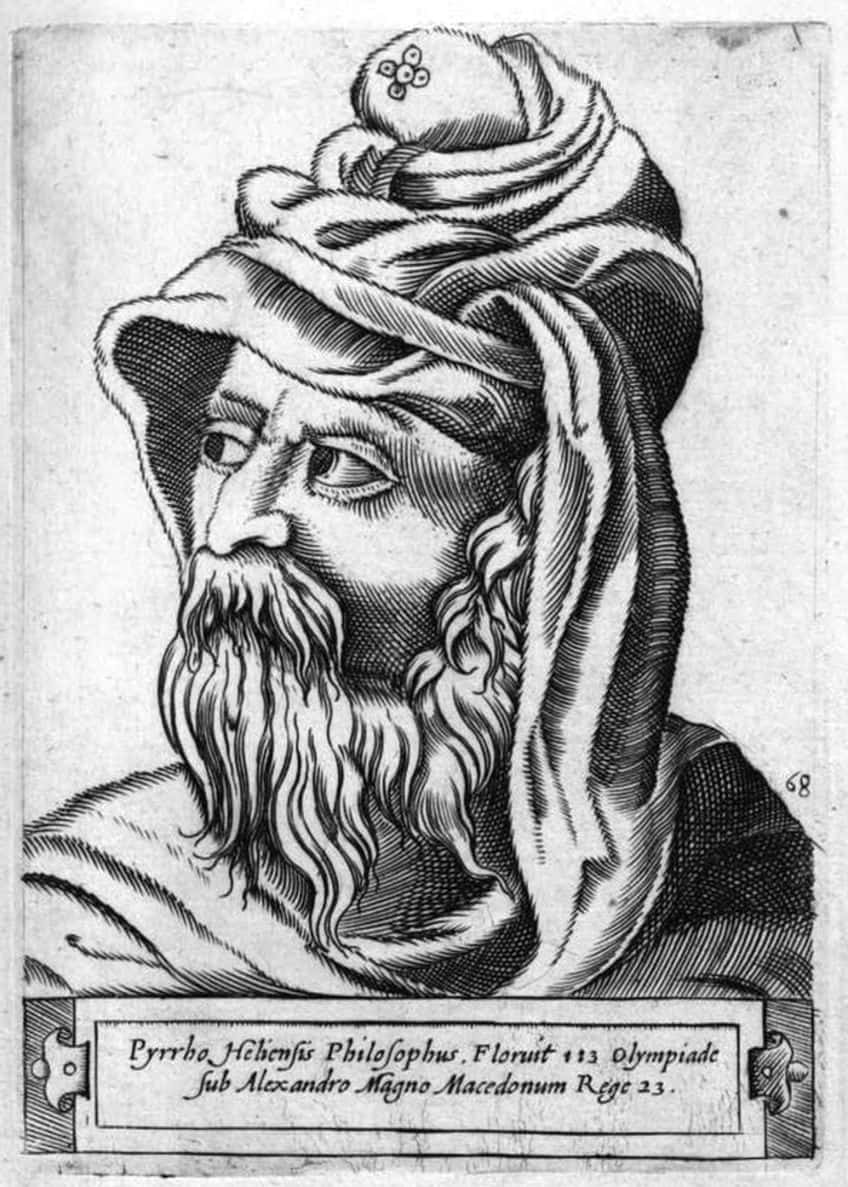
Epicurus (341 – 270 BCE)
| Name | Epicurus |
| Date of Birth | February 341 BCE |
| Date of Death | 270 BCE |
| Nationality | Greek |
| Associated Concepts and Themes | Ethics, epistemology, physics, and theology |
| Notable Publications or Ideas |
|
Epicurus was a famous ancient Greek philosopher who was credited with founding the school of Epicureanism. The aim of Epicurus’ philosophy was centered on pursuing pleasures and avoiding the path of strife and pain to achieve happiness. According to Epicurus’ philosophy. He believed that pleasure was an element of the highest good and suggested that a true sense of pleasure was achieved by avoiding excess and fostering the enjoyment of simple pleasures. Another essential tenet of Epicureanism was that the fear of death and the fear of higher beings such as God were unnecessary to the achievement of happiness and therefore living in the present moment and enjoying it was key to living a happy life.
According to records, Epicurus was known for his simple and modest personality and someone who lived a frugal lifestyle.
He encouraged his followers to also pursue a modest way of living while enjoying the pleasures of life. In addition to his theories on ethics and the pursuit of living a happy life, Epicurus was also responsible for the theory that knowledge evolved through the senses and that the universe was made up of atoms that operated randomly in space. Additionally, Epicurus also contributed to the fields of physics and epistemology, While challenging traditional theories and beliefs about Greek gods and the afterlife. It was no surprise that Epicurus’ philosophy was controversial, considering how much the ancient Greek civilization valued their gods.
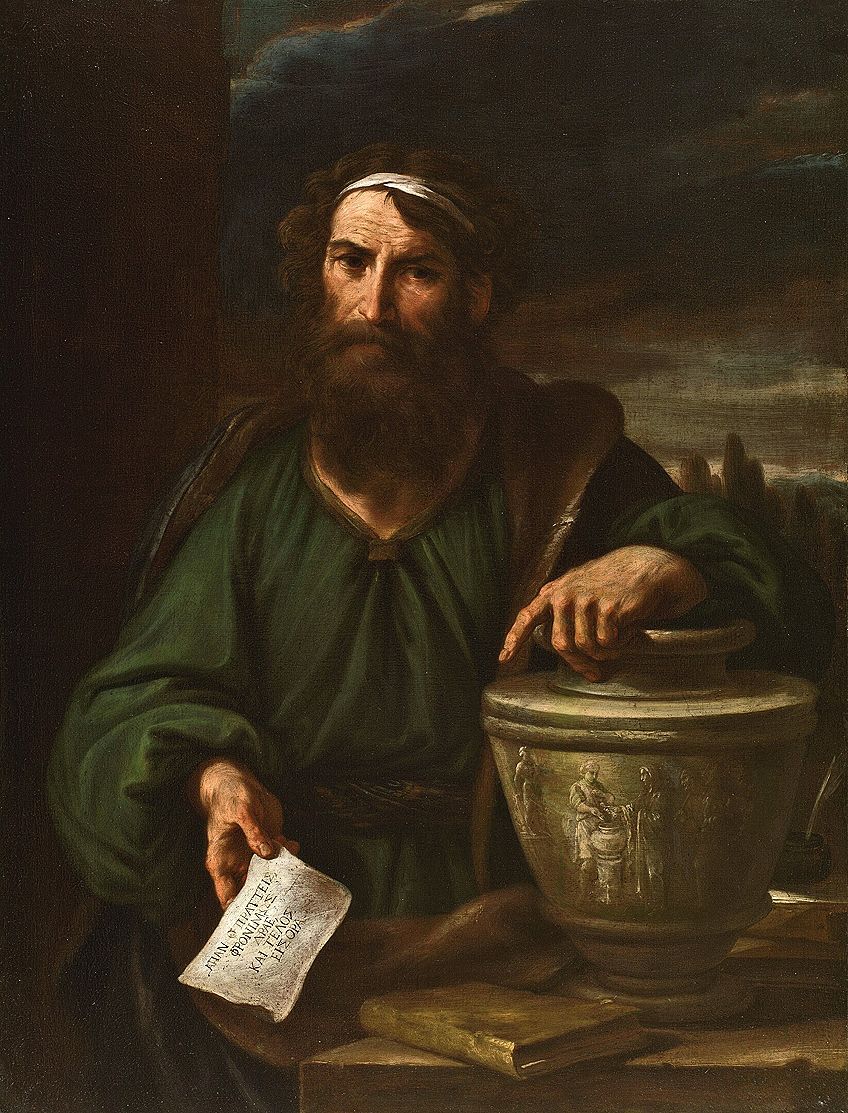
Zeno of Citium (334 – 262 BCE)
| Name | Zeno of Citium |
| Date of Birth | c. 334 BCE |
| Date of Death | c. 262 BCE |
| Nationality | Greek |
| Associated Concepts and Themes | Logic, physics, ethics, Stoicism, Hellenistic philosophy, and Western philosophy |
| Notable Publications or Ideas |
|
Zeno of Citium was perhaps one of the most influential Greek philosophers of all time, who was credited with inventing the philosophy of Stoicism. One of Zenos’s most critical theories about living a happy life was to live in harmony with nature, which he viewed as a rational and interconnected system. Zeno also focused on the importance of reason and maintaining self-control while achieving the goal of living in harmony with nature. One of the main arguments behind Stoicism was that one should not become too attached to their material possessions or focus on their external circumstances. Zeno’s philosophy was inspired by other Greek philosophers such as Socrates and Heraclitus, and informed his development of the Stoic paradoxes, which are composed of a series of statements that challenged the traditional and common beliefs about the world. These Stoic paradoxes encouraged the public to rethink any assumptions about the world and included statements that alluded to practicing virtues such as forgiveness and patience.
Stoicism also presents the idea that one’s enemies are opportunities instead of challenges and that the difficulties that enemies may inflict or create can be reinterpreted as an opportunity for practicing forgiveness and patience.
When looking at Stoicism, one might also question what it means to live a virtuous life. Zeno’s philosophy on loving a virtuous life was centered on the ultimate goal of achieving a state of moral perfection. This state of moral perfection was proposed to only be achieved through a lifetime of practicing methods of self-improvement and keeping abreast with developments in morality, ethics, and other modern philosophies. Today, Zeno’s concept of Stoicism has become an influential aspect of modern philosophy as well as psychology that continues to be debated and inspires many today to form their own beliefs of reason and self-development in line with morality.
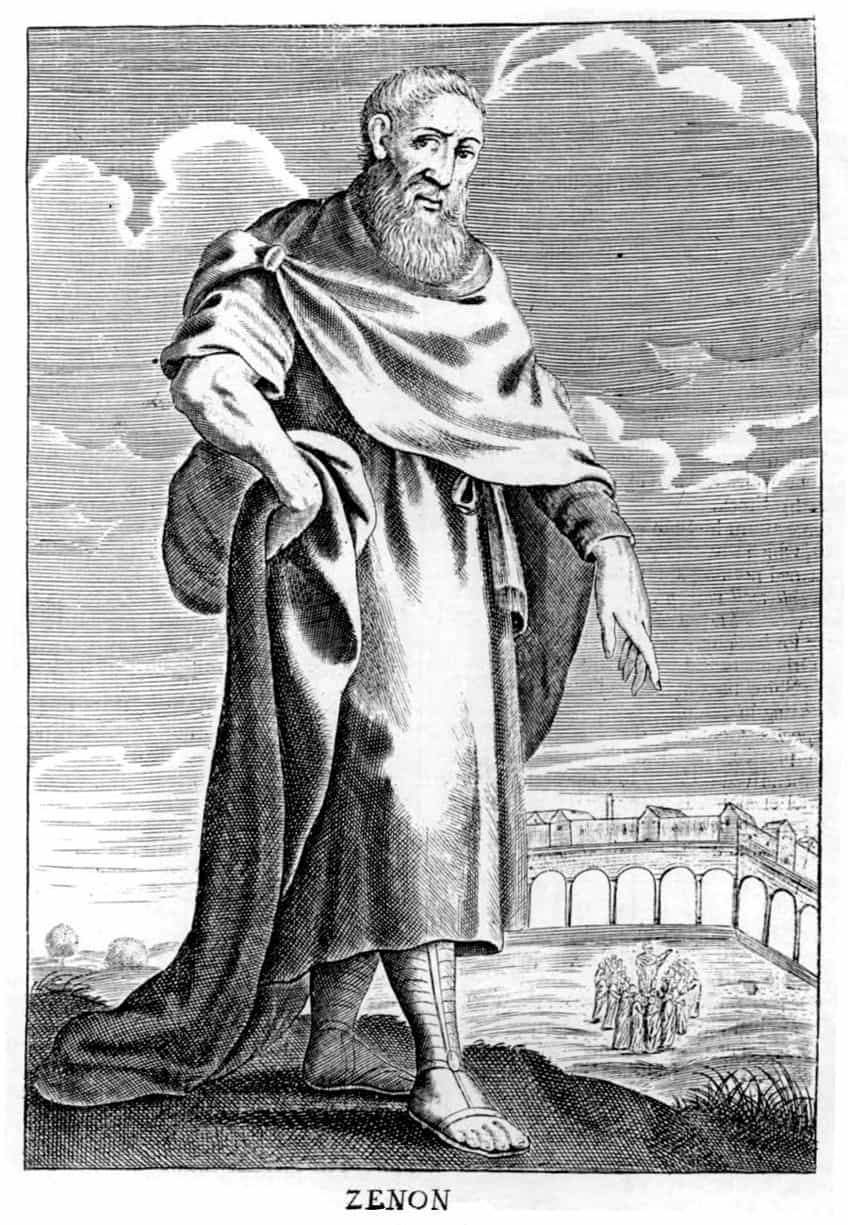
Greek philosophy was essential to the development of the modern world and is celebrated for its contribution to the fields of ethics, science, politics, and metaphysics. Greek philosophy has also enabled us to question and critique our own assumptions of virtuous lifestyles, knowledge, truth, and rationalism in the broader scheme of Contemporary living. From the critical thoughts of Socrates to the Stoicism of Zeno, ancient Greek philosophy has left a profound and diverse legacy from which we can continue to learn from and craft a better set of philosophies for the future generations.
Frequently Asked Questions
What Is Ancient Greek Philosophy?
Ancient Greek philosophy refers to the development of different systems of thought that emerged during the 6th century BCE and was informed by observable phenomena. Ancient Greek philosophy evolved across the Hellenistic period and throughout the Roman Empire as systems of thinking that were used to make sense of the world using logic, scientific thinking, and rationality.
What Were the Most Important Concepts from Greek Philosophy?
Among the many important concepts from Greek philosophy was the idea of using rational, scientific, and logical thinking to make sense of the natural world impartially. Among the most important schools of philosophy included the pre-Socratic schools of philosophy such as the Milesian School, the Ephesian School, the Eleatic School, Pluralism, Pythagoreanism, Atomism, and Sophism. The important post-Socratic schools of philosophy included Cynicism, Skepticism, Epicureanism, and Stoicism.
Who Were the Most Influential Greek Philosophers?
Prominent Greek philosophers such as Socrates, Plato, and Aristotle were considered to be the most influential Greek philosophers of their time.
Liam Davis is an experienced art historian with demonstrated experience in the industry. After graduating from the Academy of Art History with a bachelor’s degree, Liam worked for many years as a copywriter for various art magazines and online art galleries. He also worked as an art curator for an art gallery in Illinois before working now as editor-in-chief for artfilemagazine.com. Liam’s passion is, aside from sculptures from the Roman and Greek periods, cave paintings, and neolithic art.
Learn more about Liam Davis and about us.
Cite this Article
Liam, Davis, “Famous Greek Philosophers – A Look at Ancient Greek Philosophy.” artfilemagazine – Your Online Art Source. July 5, 2023. URL: https://artfilemagazine.com/famous-greek-philosophers/
Davis, L. (2023, 5 July). Famous Greek Philosophers – A Look at Ancient Greek Philosophy. artfilemagazine – Your Online Art Source. https://artfilemagazine.com/famous-greek-philosophers/
Davis, Liam. “Famous Greek Philosophers – A Look at Ancient Greek Philosophy.” artfilemagazine – Your Online Art Source, July 5, 2023. https://artfilemagazine.com/famous-greek-philosophers/.


